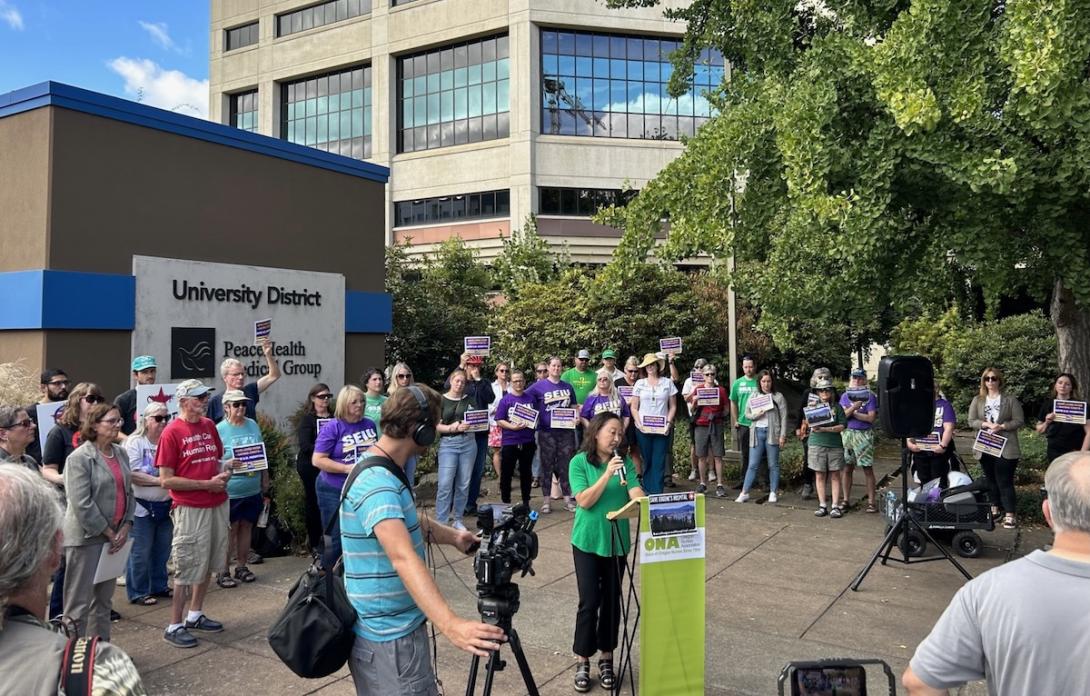
Nearly a year after PeaceHealth closed its University District hospital in Eugene, two unions say patients are languishing in a nearby emergency department or are skipping care over long wait times.
PeaceHealth’s decision to close the money-losing hospital in December left Oregon’s second-largest city without an emergency department, sparking concern among community members and elected officials. The closure means patients must seek care six miles away at PeaceHealth’s RiverBend hospital in Springfield, straining the region’s emergency response system and catching the attention of lawmakers.
Results of an unscientific survey released by the Oregon Nurses Association and its allied union, the Pacific Northwest Hospital Medicine Association, indicated that responding patients and providers reported an overwhelmingly negative experience from the closure.
Patients said they waited eight hours or more in the crowded RiverBend emergency department while seeking care for back pain, appendicitis or other infections. Others complained of having to wait months to schedule appointments for less urgent medical issues and having less time with providers.
“There is a great deal of emotional distress for the nurses and other staff. There is a sense of moral burnout that occurs when that’s happening every single day.”
“It very much feels like there is a push to get patients into rooms so that we can get them back out so we can see the next patient,” Rob Sabin, an emergency department nurse at RiverBend.
PeaceHealth leaders had defended the closure as a necessity. In the fiscal year that ended June 30, PeaceHealth reported a $67 million loss on operating revenues of $3.5 billion. That was an improvement from a $240 million loss the previous year.
Asked about the new survey, PeaceHealth issued a statement to The Lund Report indicating that the RiverBend emergency department is on track to see its shortest wait time in the last 12 months while management continues to open more beds at the facility and recruit additional staff.
“Since the closure of University District, PeaceHealth has been fully focused on improving wait times and efficiency at the RiverBend Emergency Department,” according to the statement.
In October, the Catholic nonprofit health system acquired four clinics in Vancouver, Washington. It is proposing to join with a private equity backed firm to open a 96-bed behavioral health hospital in Springfield, crediting Gov. Tina Kotek’s push to increase rates paid for the scarce service.
Long waits for emergency care
Sabin worked at the University District hospital from 2015 until its closure, caring for students, unhoused people and vulnerable populations brought in by police or CAHOOTS, the local mobile crisis intervention program.
Sabin recalled that before its closing, the University District hospital saw roughly 80 to 100 patients a day. RiverBend sees about double that number and the larger volume of patients makes it difficult for nurses to establish a connection with them, he said.
“I certainly continue to hear concerns from constituents about lack of access to care, particularly for unhoused folks and university students.”
Sabin said the emergency department has wait times up to three or four hours each day with one patient waiting 12 hours.
“There is a great deal of emotional distress for the nurses and other staff,” he said. “There is a sense of moral burnout that occurs when that’s happening every single day.”
Results of the survey were gathered during about three weeks in September and received about 150 responses. It did not use weighting or other scientific polling methods and its questions focused on negative experiences.
Previously, PeaceHealth officials said the University District had seen declining use while the RiverBend campus had more capacity. The Vancouver, Wash.-based Catholic nonprofit said it would leave the hospital’s behavioral health unit open until it could find another location.
Locals try to fill gaps
State Rep. Nancy Nathanson, D-Eugene, successfully sponsored a bill earlier this year that directed $1.3 million toward additional ambulance services for the region. The bill also included another $3.2 million aimed at spurring innovations in Lane County that would decrease the use of emergency departments and could be replicated elsewhere.
The county has begun awarding the money to local organizations and governments for projects intended to make telehealth more accessible, extending hours at an urgent care clinic and mobile units that will deliver medical services directly to vulnerable populations. The county is planning to showcase the projects to the public on Monday.
Laurie Trieger, chair of the Lane County Board of Commissioners, told The Lund Report that since the closure, the county has launched a behavioral health stabilization center and mobile crisis services that connect people in crisis to qualified mental health professionals.
That said, she added, “I certainly continue to hear concerns from constituents about lack of access to care, particularly for unhoused folks and university students.”